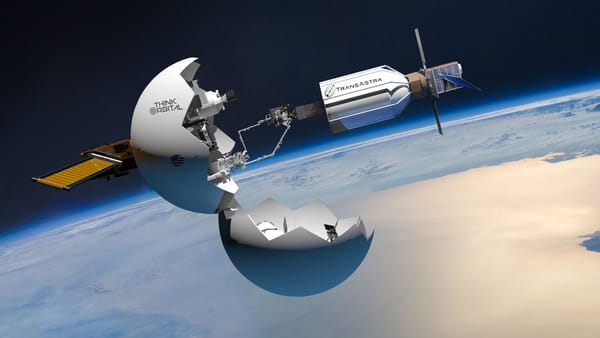NASA has a truly simple idea for cleaning up space - all it took was a little imagination!

TransAstra has won a NASA contract to develop a system for recovering space debris. The idea is so simple and elegant, it's hard to believe that nobody had thought of it before.
Space is a dump. There are thousands of satellites orbiting the Earth, but according to one 2020 study, more than half of them are no longer functional. Those dead satellites, plus the load of debris from rockets from space launches means that the Earth is surrounded by a cloud of space junk made up of millions of objects aimlessly spinning around, and occasionally smashing together, creating even more, smaller bits of junk. There is so much stuff out there in fact, that it is becoming seriously difficult to safely launch rockets and ensure the security of the satellites we rely on every day. To try to combat the problem, NASA made a call for projects that could help to clean up our orbit, with the winning contract going to space logistics startup TransAstra with their beautifully simple concept.
According to TransAstra, the best way to clean up all this mess is to send in Pacman. At least that's what their concept reminds us of: a huge circular garbage bag which will float through space, opening and closing to 'eat' the debris it encounters. The inflatable capsule will be built in a number of different sizes, and will collect as much as possible per trip, to ensure that it is cost-effective.

According to Joel Sercel, the founder and CEO of TransAstra, the main advantage of this system is that it will work with a vast range of debris types, and doesn't require precision guidance. "It doesn't require the target to have any fixture that you can grab onto," Sercel said. "It does not require docking, which is a precision maneuver. You [just] have to be precise enough to open the bag, get the bag around this thing and close the bag."
Once the bag is full, the next step is to bring it to an in-orbit processing station. TransAstra will be partnering with ThinkOrbital to create a 37-meter platform designed to receive the junk, equipped with tools to analyze, repair, and recycle the debris. The overall goal is to save fuel by sending as little trash back to Earth as possible, and reusing the maximum components.
And the savings are no joke: according to a study by the two companies, using this kind of system will cost 6 times less than sorting the debris on Earth. This will use 82% less fuel, and speed up the disposal time by 40%.
It might take a while before you can spot Pacman – sorry, the TransAstra garbage bag – eating its way through the field of space trash through your telescope, but with the company gearing up to do it's first on-the-ground tests, we hope it won't be a long wait.

